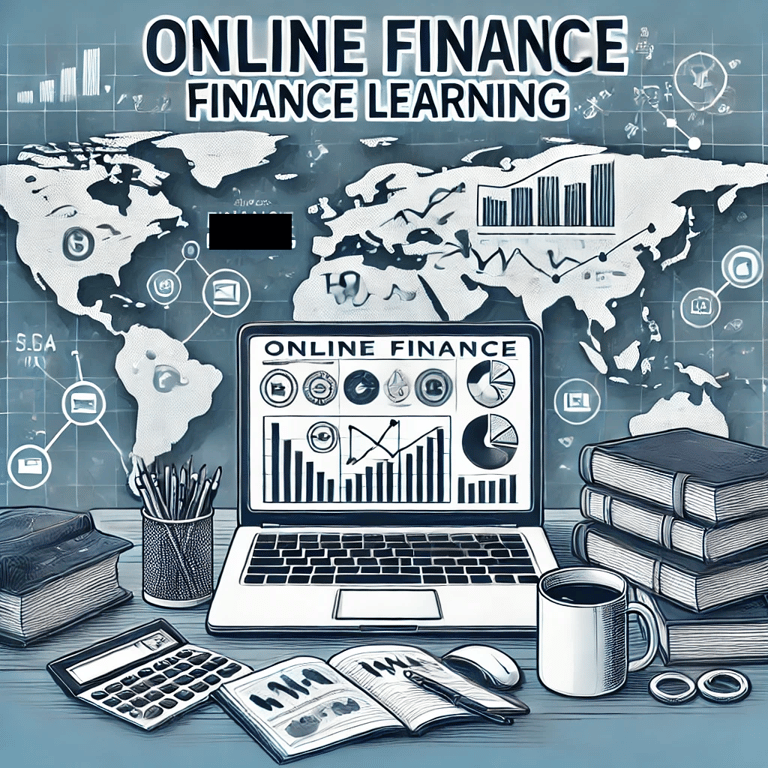Top Online Finance Courses to Elevate Your Higher Education Journey
edubeatsworld.com
Don’t you remember how finance was viewed a decade ago? Everyone termed it as rigid, difficult to learn and was termed unapproachable - isn’t it? Well, the times have changed, and in today’s world, online learning has brought learning closer to the doorstep of learners. Well, online learning has enhanced every field and branch of study out there, including finance! The understanding of the global markets has become complex for the learners, and so there is an immediate need for personnel having proper and vast know-how of the various diversifications that exist in the broad field of finance. In this post, we’ll dive into why finance matters so much in higher education and take a look at some of the top online finance courses out there. These courses aren’t just informative—they’re designed to give learners the knowledge and skills they need to succeed in a fast-paced, competitive field.


The Growing Importance of Finance in Higher Education
Finance is an important backbone of the global economy that influences various decisions that are taken by human beings at every moment in their lives, be it from personal investments to corporate maneuvers on a multinational scale. There is a necessity for learners to have a sound understanding of financial principles and theories. So higher education must incorporate finance courses like investment risk, budgeting, and economic trends, which would empower them to face the intricate global landscape that exists in the field of finance- which would make them to make informed decisions that would benefit them and their organizations too.
The Rise of Online Learning in Finance Education
The digital revolution has made education available to everyone, breaking down geographical and socioeconomic barriers and making high-quality learning resources accessible to a global audience like never before. Today, you find there are available innovative online learning platforms, which are ready to cater to learners from any background with world-class educational content, without the need for physical attendance, thereby opening doors to those who may have faced challenges in traditional learning environments.
Online learning platforms offer unparalleled flexibility, which allows learners to adjust their education to their individual demands. The learners are allowed to attend sessions, be they self-paced modules or live sessions, from anywhere and can create their own schedules and decide when, how, and what to study.
These online programs often provide flexible pricing options, with some even providing free courses or financial aid to those who qualify for it. These platforms offer a vast tapestry of course options, enabling learners to explore a wide range of topics—from foundational personal finance principles to advanced financial modeling techniques.
Many of these online finance courses emphasize skills and competencies that the learners are required to utilize in their real work environment. When the learners engage with interactive materials, simulations, and case studies, they will not only gain theoretical knowledge but also develop the tools and techniques necessary to navigate complex financial scenarios effectively.
These online platforms that provide finance courses foster vibrant online communities through forums, discussion boards, and group projects, which would facilitate meaningful connections between peers and industry professionals across the globe, allowing learners in the field of finance to build valuable networks that can enhance their career prospects in that field.


Top Online Platforms Offering Finance Courses
Several well-known online platforms provide a wide array of finance courses that are meant to cater to diverse educational demands of both students in the field of higher education and learners in the field of finance.
These platforms use cutting-edge technology and expert instruction to create engaging learning experiences that are accessible anytime and anywhere to learners worldwide.
Coursera: Coursera continues to partner with prestigious universities such as Yale, Columbia, and the University of Chicago, offering a diverse catalogue of finance courses that cater to various interests and skill levels. Notable courses include "Financial Markets," led by Yale professor Robert Shiller, and "Corporate Finance" from Columbia Business School.
edX: edX features programs from renowned institutions like MIT, Harvard, and Georgetown University. Courses such as "Finance for Everyone," which focuses on essential financial principles for non-specialists, and "Introduction to Corporate Finance," provide learners with comprehensive insights into financial decision-making.
Udemy: Udemy offers finance courses such as "The Complete Financial Analyst Course" and "The Investment Banking Course" which are particularly popular and are created to provide practical skills that the learners can immediately apply at the workplace.
LinkedIn Learning: LinkedIn Learning provides over 100 finance courses that range from foundational topics, such as "Finance Fundamentals" and "Financial Statements Explained," to advanced subjects, including "Financial Modeling and Forecasting Financial Statements."
Khan Academy: Khan Academy features a comprehensive finance section that encompasses topics from foundational personal finance to investment principles and macroeconomic concepts.
These platforms not only offer a wide variety of finance courses that are meant for a wide range of learners but they always continue to evolve, incorporating new content and features that are required to face the changing demands of the financial landscape.
Recognized Finance Certifications to Advance Your Career
Some of the professional certifications that can significantly enhance employability and credibility in the finance sector:
Chartered Financial Analyst (CFA): Conferred by the esteemed CFA Institute, it requires that the candidates successfully navigate three challenging levels of exams that test their financial knowledge, investment analysis, and portfolio management. Furthermore, candidates must accumulate at least four years of relevant professional experience.
Certified Financial Planner (CFP): The CFP designation is centered around financial planning, wealth management, and holistic financial advisory services. To attain this certification, candidates must complete a comprehensive education program, pass a challenging examination, and demonstrate significant experience in the field of financial planning. This credential is increasingly recognized as a benchmark for professionalism in personal finance, equipping professionals with the tools to provide tailored advice to clients, manage their assets effectively, and navigate complex financial situations.
Financial Risk Manager (FRM): Specifically tailored for professionals specializing in risk management, the FRM certification is administered by the Global Association of Risk Professionals (GARP). Achieving this credential requires passing two rigorous exams that cover key topics such as market risk, credit risk, operational risk, and risk management techniques. In addition, candidates must demonstrate a minimum of two years of professional experience in the risk management field, highlighting the certification's emphasis on practical knowledge and expertise. The FRM designation is widely respected and sought after by institutions looking to mitigate risk and ensure regulatory compliance in an increasingly complex financial environment.


Integrating Online Finance Courses with Traditional Degrees
Combining online certifications with traditional degrees offers a significant competitive edge in today’s dynamic job market. Employers are increasingly acknowledging the importance of online credentials, particularly those earned from reputable platforms that adhere to high educational standards. According to review of Business schools, a notable 61% of hiring leaders regard online credentials as equivalent to, or even superior to, those obtained through traditional in-person programs. This perspective reflects a growing recognition of the rigorous skills and knowledge that online learning can provide. By integrating certifications with a foundational degree, students can tailor their educational experiences to focus on niche areas within finance, such as fintech, sustainable investing, or risk management, ensuring they remain relevant and responsive to industry trends. Moreover, this approach demonstrates a commitment to continuous learning and professional development, signaling to employers that candidates are proactive and adaptable—qualities that are increasingly valued in a rapidly changing economic landscape. Ultimately, this strategic blend of education empowers individuals to stand out and positions them for success in a competitive financial job market.
Conclusion
The fusion of online learning and finance education presents extraordinary opportunities for both students and professionals in an increasingly interconnected world. By harnessing the flexibility, accessibility, and broad range of courses provided by online platforms, learners can effortlessly acquire essential financial skills that enhance their formal education and actively drive their career advancement. This innovative learning model allows individuals to tailor their studies to meet their unique interests and career aspirations, whether they're diving into cutting-edge topics like blockchain finance or mastering fundamental budgeting strategies. As B.B. King wisely remarked, "The beautiful thing about learning is that nobody can take it away from you," highlighting the enduring value of knowledge. Embarking on this educational journey not only bolsters personal competencies and professional qualifications but also plays a pivotal role in fostering a more financially literate and empowered society. As individuals become more equipped to make informed financial decisions, they contribute to the collective well-being and economic resilience of their communities, paving the way for a brighter financial future for all.
RELATED POSTS
contact@edubeatsworld.com
© 2024. All rights reserved.
